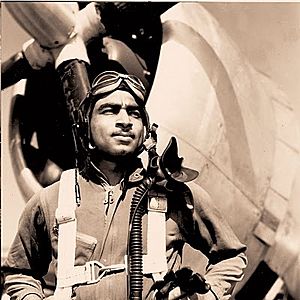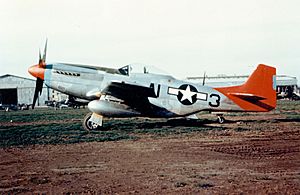Spann Watson facts for kids
Quick facts for kids
Spann Watson
|
|
|---|---|

Spann Watson at Lockbourne AFB in the late 1940s
|
|
| Born | August 14, 1916 |
| Died | April 15, 2010 (aged 93) |
| Allegiance | United States of America |
| Service/ |
United States Army Air Forces |
| Years of service | 1941–1964 |
| Rank | Lieutenant Colonel |
| Unit | 332d Fighter Group |
| Battles/wars | World War II |
| Awards | Congressional Gold Medal awarded to the Tuskegee Airmen |
Spann Watson (born August 14, 1916 – died April 15, 2010) was an American pilot and government worker. He was a brave member of the Tuskegee Airmen during World War II. He flew more than 30 important missions over North Africa, Italy, and Southern Europe.
In March 2007, Watson and other surviving Tuskegee Airmen were honored. They received the Congressional Gold Medal for their amazing service. This special award was given at the U.S. Capitol building. Spann Watson passed away on April 15, 2010, at 93 years old. He was one of the first African American U.S. military pilots to fight in the air against an enemy. He shared this honor with other pilots from the 99th Fighter Squadron.
Contents
Biography
Early Life and Education
Spann Watson grew up on his family's farm near Johnston, South Carolina. In 1927, his family moved to Lodi, New Jersey. There, he finished school and went to Hackensack High School.
In 1937, he started studying Mechanical Engineering at Howard University. While at college, he also earned his private pilot's license. This meant he could fly planes on his own.
Military Service and the Tuskegee Airmen
Watson joined the military as a Flying Cadet in November 1941. He completed his pilot training at a special, segregated base. This was the Tuskegee Army Air Field in Tuskegee, Alabama. In 1942, he became one of the first members of the 99th Fighter Squadron. This group was the very first of the famous Tuskegee Airmen to fight in World War II. They were also the start of the 332nd Fighter Group.
In April 1943, Watson was among the first 27 pilots of the 99th Fighter Squadron. They were led by Lieutenant Colonel Benjamin O. Davis, Jr. They were sent to Casablanca in North Africa. On June 9, 1943, Watson was part of a group of six P-40 planes. This group, led by 1st Lt Charles Dryden, took part in a historic event. It was the first time black American pilots fought in the air against the German air force, called the Luftwaffe.
Watson flew many combat missions with the 99th Squadron. He flew P-40 planes from North Africa, Sicily, and the Italian mainland. After his combat missions, he returned to the United States. He became an instructor pilot for the new 332nd Fighter Group. He flew different types of planes, including the P-39, P-47, P-51, and B-25. He taught at several airfields across the country.
While at Freeman Field in Indiana, he was part of the "Freeman Field Mutiny." This was a protest against unfair rules that separated black and white soldiers on the base. After the war, he worked as the Operations Officer for the 99th Squadron. This was until the Air Force became integrated in 1949. This meant black and white soldiers could serve together.
Later, he managed air traffic control in Hawaii. He also became Chief Controller for Air Defense Control Centers. These centers were in places like Long Island, New York, Misawa, Japan, and Taipei, Taiwan. In 1962, he became the Director of the Air Defense Center at Stewart Air Force Base. In 1963, he became a Team Leader for the Air Inspector General's Office.
Spann Watson served in the Air Force for over 23 years. He became a Command Pilot, which is a very skilled pilot. He flew for more than 5000 hours. He retired from active duty as a Lieutenant Colonel on December 1, 1964.
Civilian Aviation Career
In 1965, Spann Watson started a new career. He worked for the Federal Aviation Administration (FAA) for 27 years. The FAA is in charge of air travel safety in the U.S. He first worked as an Equal Opportunity Specialist. Later, he became a Senior Air Traffic Specialist. He also helped connect military and civilian air traffic.
During his time at the FAA, he helped many military and civilian aviation workers. He also helped more than 30 African Americans get into important military academies. These included Annapolis, West Point, and the Air Force Academy. He retired from the FAA on August 3, 1992.
Tuskegee Airmen, Inc.
Spann Watson was a very important person in the Tuskegee Airmen Incorporated group. He was one of its founding members. He also served as president of the group for two terms. He signed the official papers to create the organization.
Honors and Awards
Spann Watson received many awards for his service:
- Air Defense Medal
- Distinguished Service Medal
- Air Medal with 2 Oak Leaf Clusters
- Army Commendation Medal
- Congressional Gold Medal (awarded to the Tuskegee Airmen in 2006)
- Legion of Merit
See also
- Dogfights (TV series)
- Executive Order 9981
- List of Tuskegee Airmen
- Military history of African Americans
- The Tuskegee Airmen (movie)
 | Aaron Henry |
 | T. R. M. Howard |
 | Jesse Jackson |


